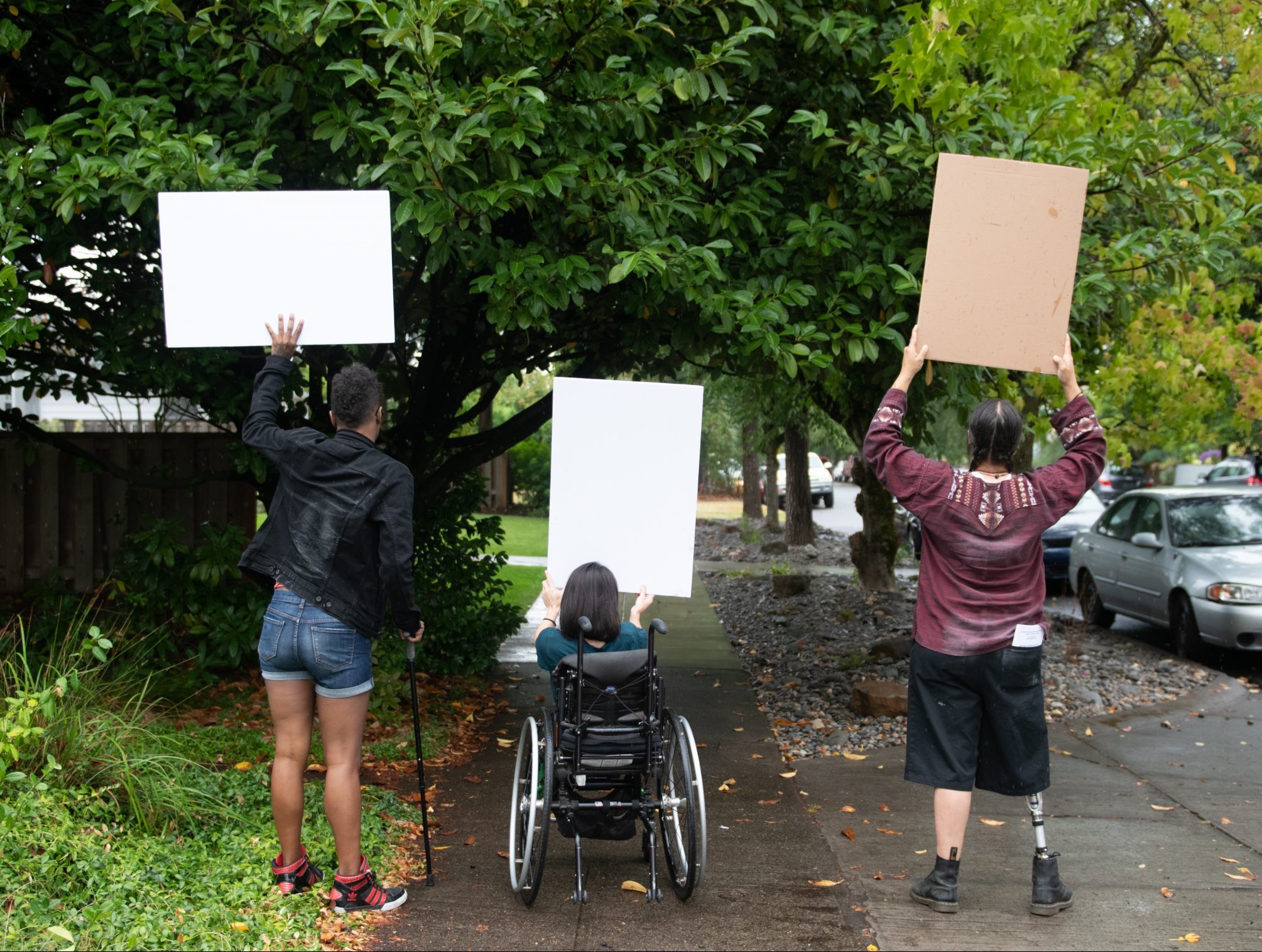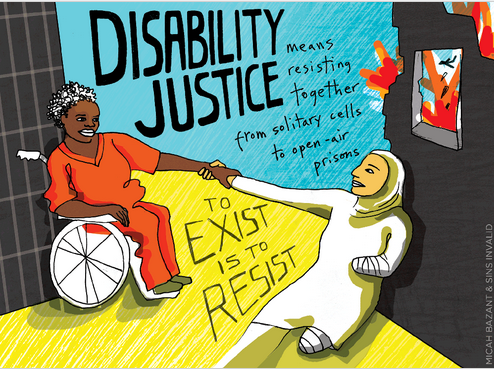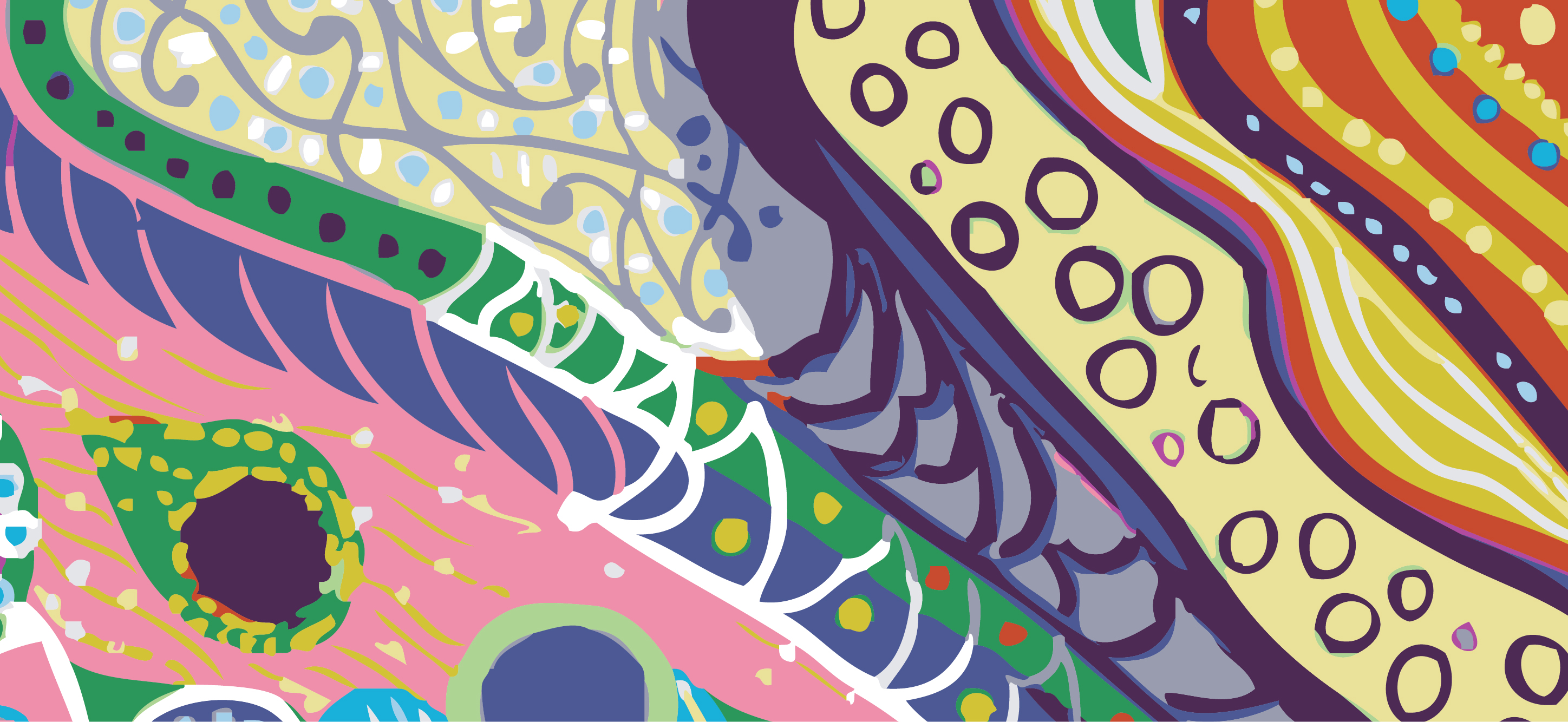
Photo credit: Chona Kasinger via Disabled And Here
“The better we understand how identities and power work together from one context to another,
the less likely our movements for change are to fracture.” – Kimberle W. Crenshaw
In the time following its introduction, the theory of intersectionality has become a fundamental aspect of a wide range of feminist and queer scholarship in academia, and in recent years has spilt into public and media discourse. A term and theory coined by Black feminist and critical race scholar Kimberle Crenshaw, intersectionality is an analysis of how different systems of domination operate and interact with one another to create specific forms of oppression, marginalisation and discrimination, therefore shaping the way that different aspects of a person’s identity can change how they experience the world. This theoretical framework also describes how these same systems grant privilege, security and protection to certain bodies and identities, which primarily function and are upheld through the oppression of other bodies systemically.
In her theory, Crenshaw argues that analyses of oppression were often unidimensional and exclusionary, with feminist movements historically centring solely on the experiences of white Western women and with earlier Black liberation movements centring on the perspectives of Black American men. In her legal work on domestic violence cases against Black women and other women of colour, she focused her analysis on how racism and sexism intersect to shape the barriers that primarily prevent Black women’s access to justice and accountability. It is with this in mind that many intersectional feminist theorists argue that for women of colour, gender is always raced and race is always gendered!
In recent times, intersectionality has evolved as a concept, with the rise of abolitionist and anti-carceral feminisms continuously beckoning us towards collective work on building an inclusive and liberated world. While there is an evident rising and centring of intersectional feminist frameworks and perspectives in dominant feminist discourses, particularly given that it has become a buzzword in contemporary mainstream culture, it is often watered down, misappropriated and in many ways still heavily sidelined. This has been and continues to be the case not only within the current media culture and identity politics but also within a lot of human rights and feminist networks. While the recognition of human rights is an ongoing struggle for many liberation movements, approaches to activism and advocacy have historically failed to consider the complex and nuanced dimensions of intersectional oppression and discrimination for multiply marginalised and oppressed women and gender-diverse people.
It is this understanding of these knowledge gaps that led to the facilitation of the recent Basic CEDAW 101 X Intersectionality workshops hosted and facilitated by IWRAW Asia Pacific for the Forging Intersectional Feminist Futures (FIFF) consortium partners. This three-part workshop series, conducted across three weeks with one session per week, delved into the basics of CEDAW, or the Convention on the Elimination of All Forms of Discrimination Against Women, as well as what it would mean to apply an intersectional approach and lens to the CEDAW framework. While CEDAW is one of the leading human rights conventions for gender equality, drawbacks and criticisms of the treaty include a lack of consideration for intersectionality and specificity, especially when it comes to racially marginalised women, sexual and gender minority women and gender-diverse people. Furthermore, while the language used within the text indicates all forms of oppression and discrimination that shape the lived experiences of all women, it nonetheless lacks overt mention and full description of multiple forms of oppression and discrimination. Hence, the main aim of the Basic CEDAW 101 X Intersectionality workshops was to work towards using an intersectional approach in conceptualising its application, particularly in the Global South.
The first workshop session dealt with the issue of the necessity of human rights, and broke down the basics of CEDAW as a human rights framework. The formation of CEDAW, being a comprehensive bill of rights for women, stemmed from a failure of holistic human rights approaches in tackling gender-based issues and discrimination against women, and therefore sought to address all areas of discrimination in the lives of women. The session discussed the substantive equality model, which shapes the Convention’s approaches to equality and is defined by equal opportunity and access to resources that are protected, secured and upheld by law and policy frameworks. The substantive equality model emphasises that in order to realise equal opportunity and equal access to opportunity and resources, unequal power relations between men and women must be abolished through recognising and implementing measures to promote women’s rights. As the Convention is also founded upon the core principle of non-discrimination, the session addressed the different forms and aspects of discrimination addressed under CEDAW and the significance of temporary special measures (TSMs) or affirmative action approaches in addressing discrimination. By the end of the session, all the participants of the workshop had a fuller, more nuanced understanding of the concept of equality in applying an intersectional lens, such as awareness of the gendered language within CEDAW that was not inclusive of gender-diverse people, allowing participants to use intersectionality to reframe and re-interpret aspects of the Convention.
The second and third workshop sessions delved into the more practical aspects of CEDAW in terms of how it can be implemented better in utilising an intersectional approach and lens. Participants learned about the role of the CEDAW Committee, being to monitor the compliance of state actors with CEDAW, to issue General Recommendations and comments based on their observations, and to decide on cases and pursue and initiate inquiry. The function of CEDAW, thus, is the potential and constant expansion of the scope of rights within the Convention as well as the scope of application. This is also done through the Optional Protocol, through which individual complaints can also be made to the Committee, allowing for the expansion of jurisprudential development in regards to the Convention. Both sessions provided a deeper insight into CEDAW providing a legal framework for women’s rights, despite there being no enforceability mechanism, for states to monitor and address the multiple forms of discrimination that women face.
The workshop sessions enabled participants from the FIFF consortium to apply CEDAW to various case studies in different contexts, even where the issues in question were not explicitly addressed within the convention, using an intersectional lens to interpret the convention in a way that it could be applicable. Ultimately, the sessions highlighted that while there are evident and existing gaps within CEDAW, it could be better understood and applied with intersectionality in mind.
Prior to the Basic CEDAW workshops, FIFF consortium partners had been introduced to the concept of intersectionality through Humanity and Inclusion’s Intersectionality in Practice three-day workshop sessions, whereby participants applied the concept to different contexts as well as learning how to operationalise an intersectional approach to strengthen cross-region advocacy movements. Consortium partners engaged in activities such as the ‘power walk’ exercise, using different case studies to look at how the different axes of oppression and privilege manifest and operate, and assessed and analysed their own individual positionalities and identities. The Intersectionality in Practice workshop sessions also delved into applying intersectional approaches to the internal working of organisations.
Another workshop series conducted after the Intersectionality in Practice sessions within the FIFF consortium was the Intersectional Feminist Advocacy and Cross-Movement Advocacy Workshop with CREA, which focused on disability justice and exploring intersectional feminist approaches to tackling and dismantling ableism. Each session explored and unpacked the different disability frameworks, the constructed barriers that create and perpetuate stigma around disability, and how disability and ableism both intersect with other aspects of identity, shaping different and diverse lived experiences. Both the Intersectionality in Practice and the Intersectional Feminist Advocacy Cross-Movement Advocacy workshops led to a greater understanding of the importance of an intersectional lens and how our own positionalities and internalised biases shape who we centre and who we leave out in our advocacy and activism.

Disability Justice by Continuum, University of Minnesota. Illustration by Micah Benzant & Sins Invalid.
Overall, the engagement of the FIFF consortium with the various intersectionality workshops facilitated a greater consciousness and understanding of the need to recognise the plurality of lived experiences and to move away from conceptualisations of identity as monolithic and singular. Each session was a safe space for introspection and reflection of our own lives and how we move through the world in our bodies and identities, and how we would envision intersectionality as more than just a buzzword on social media or a theory within the realm of academia, but also as praxis that is lived out and applied in our daily lives. The recognition of intersectionality demands both individuals and movements to ask ourselves and the world difficult questions that perhaps far too many are still unprepared to or unwilling to answer. However, the work towards a liberated world requires us to ask anyway, so we can one day move beyond asking questions and start answering them with real, tangible results.
Ramya Gopal (she/they) was IWRAW Asia Pacific’s Forging Intersectional Feminist Futures (FIFF) intern from July to October 2022. Ramya is an aspiring feminist scholar with an academic background in gender and sexuality studies in which they dissect issues of racism, colourism and rights of marginalised women within a broader post-colonial lens.

